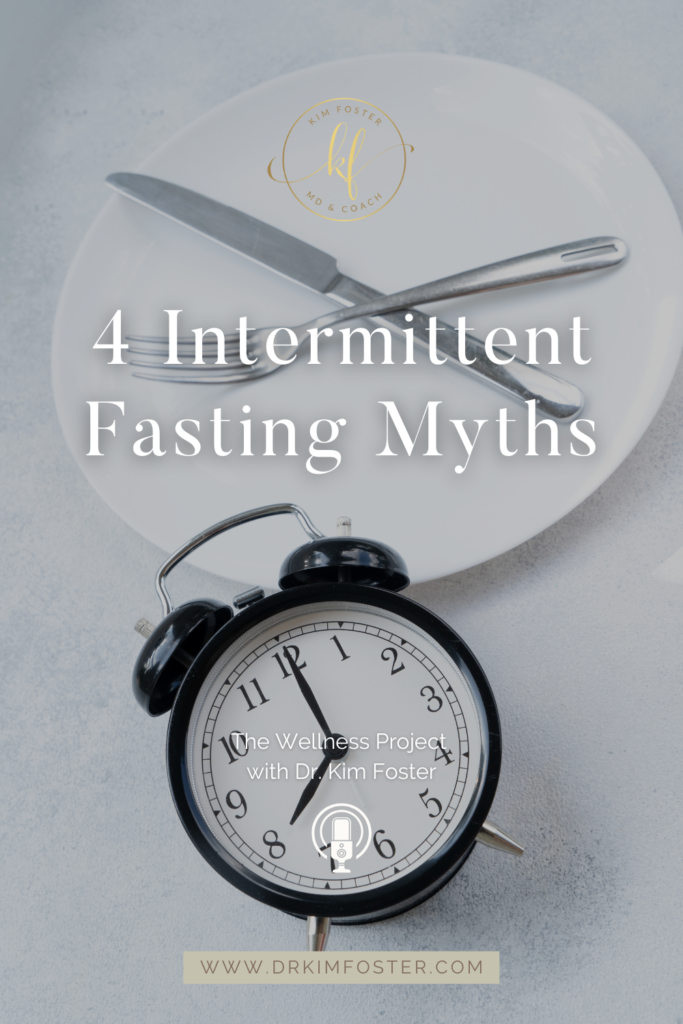Over the years, I’ve had many conversations with people about intermittent fasting. Interestingly, most people’s objections are around the same few things – all of which are not true.
While I practice intermittent fasting and have a positive experience with it, I’m not claiming these myths are false based on my beliefs and opinions. The following four common IF myths have all been debunked by research studies and scientific evidence, yet this knowledge is not mainstream.
So, if you’re considering intermittent fasting but have concerns, this article is for you. Read on to learn the truth about fasting (according to science) and make a knowledgeable, informed decision for yourself.
4 Myths About Intermittent Fasting
Myth 1 – Breakfast Is The Most Important Meal Of The Day
Although there are different intermittent fasting methods, one of the most common is restricting your eating window to an 8-hour period each day. While you can choose which eight hours of the day you eat, most people (myself included) skip breakfast and eat between 12 pm and 8 pm or something similar.
For years, we have been conditioned to believe that breakfast is the most important meal of the day. This is what leads to the common belief that intermittent fasting is bad.
Considering this, you will probably be shocked to hear that no scientific evidence supports this.
For example, a 2019 review published in the British Medical Journal analyzed 13 randomized controlled trials. The researchers found no significant differences in body weight between those who ate breakfast and those who skipped it.
Another review published in the American Journal of Clinical Nutrition in 2019 also came to the same conclusion. They found no substantial evidence supporting the idea that skipping breakfast leads to weight gain or negatively impacts metabolism.
What’s even more shocking is how this belief came about…
The line “breakfast is the most important meal of the day” was actually nothing more than a marketing slogan coined in the 19th century by John Harvey Kellogg, founder of the famous Kellogg’s cereals.
Yes, that’s right, this belief we have grown up with was simply installed in us to get us to purchase breakfast cereal!
Myth 2 – Intermittent Fasting Slows Metabolism
Many people believe that skipping meals or going for prolonged periods without eating causes our body to go into “starvation mode,” decreasing metabolism and making it impossible to lose weight.
However, scientific research shows that it is not intermittent fasting that slows metabolism but calorie restriction.
With IF, we’re not reducing our daily calorie intake; we are just condensing it into a certain number of hours. Thus, our calorie intake is not affected, having no adverse effects on our metabolism.
What’s more, several research studies show that intermittent fasting can positively impact your metabolism.
This is because, during fasting periods, your body switches from using glucose as its primary fuel source to burning stored fat for energy, which induces the metabolism of fatty acids to ketones. One early study found that IF can boost metabolism by as much as 14%.
This is why intermittent fasting is much more effective than conventional calorie restriction diets.
Myth 3 – Intermittent Fasting Causes Muscle Loss
Some people worry that when we fast, our body will break down muscle tissue for energy, resulting in muscle wasting. This belief comes from the fact that our body taps into its stored energy sources during fasting.
However, it is NOT protein that the body starts using up, but glycogen (a form of stored glucose) and fat. In fact, when our body enters a fasting state, our growth hormone levels increase, and protein synthesis (the process by which cells make proteins) also improves.
Intermittent fasting also doesn’t prevent muscle gain. Some studies have shown that intermittent fasting can help preserve and promote muscle growth when combined with resistance training, like weightlifting.
Thus, if you are worried about losing muscle, just ensure you stay physically active with resistance training in your workout routine.
Myth 4 – Intermittent Fasting Increases Cortisol Levels
Another myth I have noticed floating around about intermittent fasting is that it increases your cortisol levels, and thus, can make you feel stressed.
Now, there is some truth in this, as fasting may temporarily increase cortisol levels, especially when you first start. This is because it’s a new eating pattern that your system has to get used to, which may put some stress on your body and, in turn, increase your cortisol levels.
However, it’s important to remember that not all stress is bad. Moderate fluctuations in cortisol levels are a normal part of your body’s circadian rhythm. It all depends on how big of an increase it is, and with IF, the rise in cortisol is generally within a normal range.
Moreover, intermittent fasting has been shown to help regulate cortisol levels over the long term. Some studies suggest that intermittent fasting can improve the body’s stress response by increasing resilience to stress and reducing overall cortisol levels.
However, if you are going through a particularly stressful period, I do recommend taking a break from intermittent fasting until things settle down to avoid “taxing” the body.
Did you find this topic interesting? If so, watch the full episode on Youtube for a deeper explanation of these four intermittent fasting myths.
If you prefer an audio-only version, here’s where you can listen to the podcast episode:
Which of these myths have stopped you from trying intermittent fasting in the past? Let me know in the comments, or find me on Instagram and send me a DM!
Resources Mentioned:
To help you have a successful start to intermittent fasting, I’ve prepared a FREE CHECKLIST detailing:
- The best way to get started
- My top tips for staying on track
- How to handle any obstacles and challenges that come up
- And much more
Download it here: https://drkimfoster.com/fasting
Apply for the Wellness Coach Academy today: https://wellnesscoachacademy.com
More Helpful Resources:
- Download my FREE Marketing Checklist for Health Coaches: 12 Ways To Get Clients https://drkimfoster.com/checklist
- My Free Class: How To Build A 6-Figure Health Coaching Business Using One Signature Program
- Kim on Instagram: https://www.instagram.com/drkimfoster/

FREE CLASS!
Looking to take your wellness journey to the next level?
The 3 Secrets For Stepping Into A Meaningful New Career Without Wasting Time Or Money
- find out why health & wellness coaching is a skyrocketing industry that can provide the freedom and fulfillment you’ve been craving
- discover the 3 biggest myths about health & wellness coaching that will hold you back (and what the truth is instead)
- learn the secret sauce for getting amazing results for your clients (and building a profitable business as a wellness coach)
…and more!

Subscribe to my Podcast:






